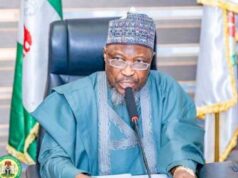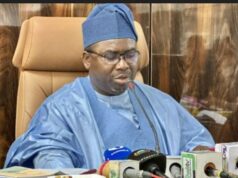
President of the African Development Bank (AfDB), Dr. Femi Adesina has challenged Nigeria to build quality health care systems that will protect its population, today and well into the future in the face of far too low vaccination facilities against COVID19 that is ravaging the world.
“Nigeria must also build world-class local pharmaceutical industries, able to effectively tackle the production of therapeutic drugs and vaccines.
“Nigeria must revamp its local pharmaceutical industry and launch strategic investments for local vaccine manufacturing.”
Dr. Adesina advance is backgrounded on the current situation in the world where in the United States of America, 54 percent of the population had been vaccinated against COVID 19, and 75 percent of the population of Europe had similarly been vaccinated while only 2 percent of African population had been vaccinated.
According to him, while developed countries are receiving booster shots, African countries cannot get basic shots.
“Africa should not be begging for vaccines; Africa should be producing vaccines.
The African Development Bank will invest $3 billion in support of local pharmaceutical industries in Africa, including in Nigeria.”
Dr. Adesina cautioned that the world is still bugged down with the effects of the global COVID-19 pandemic, which he said has caused so many deaths and upended global economic growth.
“Due to COVID-19, Nigeria’s economic growth rate declined to -1.8% in 2020. This mirrors the pattern across Africa, as the continent posted a -2.1% growth rate in GDP, its lowest in two decades.
“The African Development Bank responded rapidly in supporting African countries. We launched a $10 billion Crisis Response Facility to support countries.
“We provided $289 million in budget support to Nigeria.
“The GDP growth rate for the continent will recover to 3.4% this year. We project Nigeria’s economic growth rate will rebound to 2.4% this year and reach 2.9% by 2022.
“The recovery will depend on two critical issues: access to vaccines and tackling debt issues.”
He advised Nigeria to decisively tackle its debt challenges even though he acknowledged that the issue is not about debt-to-GDP ratio, “as Nigeria’s debt-to-GDP ratio at 35% is still moderate. The big issue is how to service the debt and what that means for resources for domestic investments needed to spur faster economic growth.
“The debt service to revenue ratio of Nigeria is high at 73%. Things will improve as oil prices recover, but the situation has revealed the vulnerability of Nigeria’s economy. To have economic resurgence, we need to fix the structure of the economy and address some fundamentals.
“Nigeria’s challenge is revenue concentration, as the oil sector accounts for 75.4 % of export revenue and 50 % of all government revenue.
“What is needed for sustained growth and economic resurgence is to remove the structural bottlenecks that limit the productivity and the revenue earning potential of the huge non-oil sectors.
“Nigeria should significantly boost productivity and revenues from its non-oil sector, with appropriate fiscal and macroeconomic policies, especially flexible exchange rates that will enhance international competitiveness.
“Infrastructure is critical for unlocking the full potential of Nigeria’s economy. Nigeria will need $15 billion a year for investment in infrastructure.
“Financial innovations should be prioritized as governments alone cannot afford these huge financial costs.
“The private sector should be given incentives to invest in infrastructure.
“The Federal Government’s 15 trillion Naira Infrastructure Fund is a good idea, so is the initiative for tax credits for private sector investment in infrastructure.
“To be sustainable and more efficient, Public-Private Partnerships (PPPs) should be accelerated to finance major infrastructure across Nigeria.
“Nigeria’s institutional investors, especially the pension funds, should invest in infrastructure. Governments can also implement ‘Infrastructure Asset Recycling models, where existing infrastructure assets on government books can be turned over to the private sector, freeing up financing for governments to invest in new infrastructure needs.
Here is the lesson: sustainable financing approaches such as PPPs and infrastructure asset recycling will allow Nigeria to attract significant private sector investment into infrastructure.”






